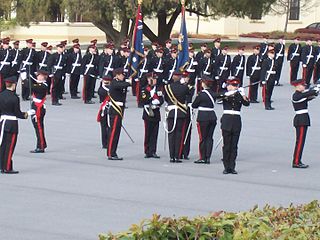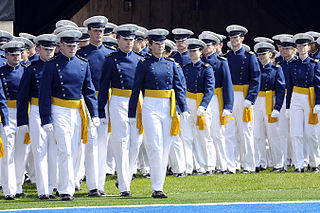
A military academy or service academy is an educational institution which prepares candidates for service in the officer corps. It normally provides education in a military environment, the exact definition depending on the country concerned.

The Air Corps is the air component of the Defence Forces of Ireland. Through a fleet of fixed and rotary wing aircraft, it provides military support to the Army and Naval Service, together with non-military air services such as Garda air support, air ambulance, fisheries protection and the Ministerial Air Transport Service. Its headquarters and airfield is Casement Aerodrome located at Baldonnel, County Dublin. Unlike the Irish Army and Irish Naval Service, the Irish Air Corps does not maintain a reserve component and thus consists entirely of active-duty personnel.

A cadet is an officer trainee or candidate. The term is frequently used to refer to those training to become an officer in the military, often a person who is a junior trainee. Its meaning may vary between countries.

The Naval Service is the maritime component of the Defence Forces of Ireland and is one of the three branches of the Irish Defence Forces. Its base is in Haulbowline, County Cork.

Russia has a number of military academies of different specialties. This article primarily lists institutions of the Armed Forces of the Russian Federation rather than those of the Soviet Armed Forces.

Canadian Forces Base Esquimalt is Canada's Pacific Coast naval base and home port to Maritime Forces Pacific and Joint Task Force Pacific Headquarters. As of 2018, 4,411 military personnel and 2,762 civilians work at CFB Esquimalt.
The Indian Defence services have established numerous academies and staff colleges across India for the purpose of training professional soldiers in military sciences, warfare command and strategy, and associated technologies.

The National Maritime College of Ireland is a public maritime college located in Ringaskiddy, County Cork, Ireland. It is a constituent college of the Munster Technological University. Founded in 2004, it is situated on former Department of Defence land aside the Haulbowline naval base, the headquarters of the Irish Naval Service. It is the first dedicated maritime college of its kind in the State, and was built under the Irish Government's Public-Private Partnership scheme, involving the Munster Technological University, the Naval Service and a number of other partners.

Nikola Vaptsarov Naval Academy (NVNA) is the oldest technical educational institution in the Republic of Bulgaria. Its history, past and present achievements establish the institution as the most prestigious centre for training of maritime specialists in the country. Its development over the years resembles a navigable river, into which many tributaries flow, as well as the "prototypes" of the present-day faculties, departments, and vocational colleges constituting the Nikola Vaptsarov Naval Academy.

The Turkish Naval Academy is a four-year co-educational military academy and part of the National Defence University. It is located in the district of Tuzla in Istanbul. Its mission is to develop cadets mentally and physically for service as commissioned officers in the Turkish Navy. It must not be confused with Naval War Institute

College of Military Engineering (CME) is a technical and tactical engineering training institution of the Indian Army Corps of Engineers of the Indian Army. Training of Combat Engineers, Military Engineering Service, Border Roads Engineering Services (BRES) and Survey done here.

The Military Academy of the University of Defence is a training college devoted to military education and career development located in Belgrade, Serbia. The academy forms part of the Serbian higher education system, offering accredited graduate and postgraduate curriculum. It contains a military high school, offering secondary-level education, and a school of national defense, which conducts officer training. The academy's facilities include a sports center with a swimming pool, a stadium with running tracks, modern classrooms for foreign language learning, and lecture theaters.
The Army Apprentice School (AAS) - Scoil Phrintisigh an Airm (SPA), was situated in Devoy Barracks, Naas, County Kildare.
An Artificer is an appointment held by a member of an armed forces service who is skilled at working on electronic, electrical, electro-mechanical and/or mechanical devices. The specific term "artificer" for this function is typical of the armed forces of countries that are or have been in the British Commonwealth and refers to a Senior Non-Commissioned Officer. Artificer is a job title and not a rank.

The Polish Naval Academy (PNA) "Heroes of Westerplatte" is a naval university supervised by the Ministry of National Defence of the Republic of Poland, with the history, uninterrupted by World War II, dating back to 1922. At present the PNA provides education for officer-cadets, commissioned officers and civilian students at first and second cycles of study, as well as doctoral studies. It also offers opportunities for professional development at specialized courses and postgraduate programs. In accordance with international agreements the PNA trains officers for naval forces of countries in Europe, North Africa, the Middle and Far East. International exchange significantly contributes to the rise in qualifications of the PNA staff. It also allows the students to attend lectures given by best specialists from leading scientific centers of the world.

An electrical artificer (EA) is an electrical technician competent in the electrical maintenance of ship's machinery such as engines and generators. This was originally a Royal Navy term for those trained and competent in the installation and maintenance of ships electrical systems.

The Defence Forces Training Centre (DFTC) is the principal training centre for the Irish Army and other branches of the Irish Defence Forces, headquartered at the Curragh Camp that serves to provide education and training to recruits and officers. The DFTC also encompasses Glen of Imaal in County Wicklow which is the primary artillery and anti-tank firing range for the army. It primarily comprises the Military College, with various schools, alongside additional specialised schools. It also hosts some specialised army units. DFTC is home to 2,000 military personnel.
Naval Support Command is one of three command components of the Irish Naval Service responsible for supporting all operations of the Naval Service, both on land and at sea. Headed by Officer Commanding Naval Support Command (OCNSC), who reports directly to the head of the Irish Naval Service, Flag Officer Commanding Naval Service (FOCNS) Commodore Hugh Tully, the Naval Support Command oversees the personnel, logistical and technical resources of the NS, allowing the service to meets its operational and training commitments. As part of NSC there are four departments within that provide various support services.
The Sri Lankan Armed Forces have established numerous academies and staff colleges across Sri Lanka for the purpose of training professional soldiers in military sciences, warfare command and strategy, and associated technologies.
This article represents the structure of the Irish Defence Forces as of May 2020:














